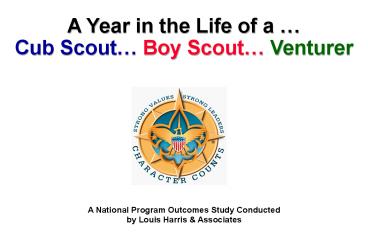BSA National Presentation - PowerPoint PPT Presentation
1 / 34
Title:
BSA National Presentation
Description:
Boys of. Same. Race. Productive/Creative Use of Time: Creative ... (percentage of Boy Scouts who learn. something new from skills instruction/presentations) ... – PowerPoint PPT presentation
Number of Views:65
Avg rating:3.0/5.0
Title: BSA National Presentation
1
A Year in the Life of a Cub Scout Boy Scout
Venturer
A Year in the Life of a Cub Scout Boy Scout
Venturer
A National Program Outcomes Study Conducted by
Louis Harris Associates
2
Six Critical Elements ofHealthy Youth Development
- 1. Strong personal values and character
- 2. A positive sense of self-worth and usefulness
- 3. Caring and nurturing relationships with
parents, - other adults, and peers
- 4. A desire to learn
- 5. Productive and creative use of time
- 6. Social adeptness
3
A Year in the Life of a Cub Scout
A Year in the Life of a Cub Scout
A National Program Outcomes Study Conducted by
Louis Harris Associates
4
Expectations vs. Experiences(percent of parents
who rate as important and who agreeCub Scouting
delivered)
Expectations
Experiences
- 98 97
- 98 96
- 97 95
- 96 98
- 96 95
- 96 95
- 95 96
- 94 90
- 93 97
- 91 96
- 89 94
- 85 98
- Have fun
- Develop new skills
- Learn to respect the feelings of others
- Be in a friendly/safe environment
- Learn social skills
- Learn moral/ethical values
- Be with positive role models
- Become involved in community service
- Develop more parent/son togetherness
- Develop a sense of belonging
- Gain a friendly discipline
- Better than watching TV
5
Personal Values and CharacterValues Developed
ThroughCub Scouting
- (percentage of parents who agree
- Cub Scouting encouraged these values)
6
Self-Worth and UsefulnessForms of Encouragement
Received
(percentage of Cub Scouts at a typical pack
meeting)
7
Self-Worth and UsefulnessSafe, Friendly
Environment
(percentage of parents who agree/disagreeCub
Scouting provides a safe environment)
98 Agree
2 Disagree
8
Caring Relationships EncouragingInteraction
Between Parents and Sons
(percentage of parents who agree Cub
Scouting encourages types of parent and son
interaction)
9
Caring Relationships Encouragement from Adults
and Other Cub Scouts
(percentage based on a typical den meeting)
10
Desire to LearnReading Together
(percentage of parents who agree Cub Scouts
encourages reading with sons)
75 Agree
25 Disagree
11
Social AdeptnessSkills and Competencies Learned
(percentage of parents who agree Cub Scouting
encouraged these skills)
12
Social AdeptnessDiversity at Pack Meetings
(percentage of typical pack meeting activities)
13
Productive/Creative Use of TimeCreative
Activities During Den Meetings
(percentage of den meetings that include these
activities)
53
14
A Year in the Life of a Boy Scout
A Year in the Life of a Boy Scout
A National Program Outcomes Study Conducted by
Louis Harris Associates
15
Personal Values and CharacterReasons to Join
Boy Scouting
(percentage of parents who rate as important)
100 80 60 40 20 0
95
94
90
86
Learning Moral Values
Learning Self- Reliance
Involvement in Community Service
Learning Respect for Others
16
Personal Values and Character Patriotism,
Integrity, Faith
(percentage of Boy Scouts who agree Scouting
strengthens these personal values)
17
Self-Worth and UsefulnessGaining Confidence
(percentage of Boy Scouts who agree Scouting
builds self-confidence)
78 Agree
20 Disagree
2 No answer
18
Caring RelationshipsReasons to Join Boy Scouting
(percentage of Boy Scout parents who rate program
attributes as important)
19
Caring RelationshipsPersonal Encouragement
Received
(percentage of Boy Scouts based on a typical
troop meeting)
20
Desire to Learn Learning New Things
(percentage of Boy Scouts who learn something
new from skills instruction/presentations)
21
Desire to LearnPeer-to-Peer Mentoring
(percentage of Boy Scouts at a typical troop
meeting)
22
Productive/Creative Use of TimeReasons to Join
Boy Scouting
(percentage of Boy Scouts/Parents who rate
factors as important)
Boys
80
Like Scout Activities
80
To go on Hikes/Trips/Outings
0 20 40 60 80 100
23
Productive/Creative Use of TimeCommon
Activities During Troop Meetings
(percentage of Scouts participating at a typical
troop meeting)
24
Social AdeptnessWorking With Others
(percentage of Scouts at a typical troop meeting)
25
Social AdeptnessLeadership Roles
(percentage of Boy Scouts who hold leadership
positions)
55 Yes
40 No
5 No Answer
26
A Year in the Life of a Venturer
A Year in the Life of a Venturer
A National Program Outcomes Study Conducted by
Louis Harris Associates
27
Personal Values and CharacterEthical Decision
Making
(percentage of Venturers who agree/disagree)
Your crew has been faced with situations when
the group had to make decisions about right and
wrong.
79 Agree
21 Disagree
28
Personal Values and CharacterService to Others
(percentage of Venturers during a typical
three-month period)
29
Self-Worth and UsefulnessBuilding
Self-Confidence
(percentage of Venturers who agree/disagree)
Being a Venturer has taught you to have
more confidence in yourself and your abilities.
The activities in Venturing help you prepare for
the future.
30
Caring RelationshipsInteractions With Parents,
Other Adults, and Peers
(percentage of Venturers who agree)
Encouraged to Share Ideas, Opinions with Group
Can Talk to Crew Advisor about Important Issues
31
Desire to LearnNew Experiences
(percentage of Venturers who agree)
Venturing gives you a chance to do things and
go places that you would not otherwise
experience.
65 Agree Strongly
28 Agree Somewhat
7 Disagree
32
Productive/Creative Use of TimeGoals and
Planning
(percentage of Venturers who agree based on
three-month period)
33
Social AdeptnessSkills and Competencies
(percentage of Venturers who practice these
skills in Venturing)
34
A Year in the Life of a Cub Scout Boy Scout
Venturer
A Year in the Life of a Cub Scout Boy Scout
Venturer
A National Program Outcomes Study Conducted by
Louis Harris Associates































